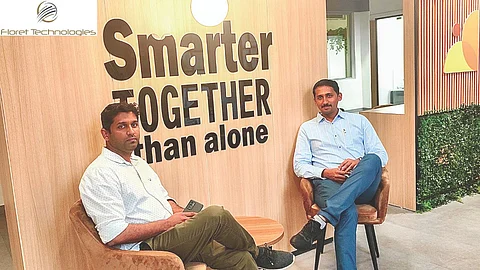

A silent revolution is underway in the quiet lanes of Thiruvananthapuram—one that flushes away an often-ignored crisis. Sanitary napkins, diapers, used condoms, tissues—all bundled together as ‘sanitary waste’—are often shut behind bathroom doors and sealed in black plastic covers. But what happens after that?
For years, no one had a real answer. Until Floret Technologies decided to ask the uncomfortable questions—and answer them, scientifically.
Despite Kerala’s commendable track record in plastic waste management—thanks to green brigades like Haritha Karma Sena—sanitary waste remains a black hole. These aren’t materials you can compost, recycle, or dump without consequences. Worse, there’s no uniform system across municipalities to collect or process them.
That’s where Floret Technologies steps in, armed not with gloves and bins, but with certified, decentralised technology—sanitary napkin incinerators that fit inside washrooms of schools, offices, hospitals and homes. No drama. Just dignity.
Floret wasn’t always in waste management. In 2017, Sanil Kumar and Anu S.S., then colleagues in a marketing firm, teamed up to start their own company. But that venture didn’t last. The business folded, but not before giving them a core philosophy: never sell what you don’t believe in.
So instead of looking for the next trending product, they turned to a silent crisis that needed solving. Manufacturing sanitary napkins was the first idea. But with capital requirements as steep as ₹3 crore, they pivoted. That’s when they stumbled upon something far more urgent—how do you dispose of sanitary waste, safely and sustainably?
What they discovered was shocking: India had no consistent method. Nor did most institutions or households. And so began their next chapter—designing scientifically approved incinerators, certified by the Pollution Control Board.
After rolling out their first sanitary napkin destroyers, Floret turned its focus to diaper waste—both baby and adult. Small-scale incinerators capable of handling two to three diapers at a time were developed in collaboration with the PCB. The response? Overwhelmingly positive.
“Even cities like Kochi lacked a dedicated collection system for sanitary waste,” says Sanil. That realisation led Floret to propose a comprehensive waste-handling project to the Local Self-Government Department. The proposal struck a chord. Municipalities were instructed to implement scientific systems for collection, transport, and destruction of sanitary waste.
Palakkad Municipality became the first to pilot it—fully funded and executed by Floret—well before state-wide guidelines kicked in. In 2022, Minister M.B. Rajesh inaugurated the project, setting a precedent.
Now, Floret is setting up Kerala’s first community-level sanitary waste-to-energy plant at Varkala’s trenching ground. Set to go live next month, this unit is more than just a destroyer—it’s a power generator, expected to produce 4 kilowatts of electricity per day.
Approved by the Ministry of Jal Shakti and showcased under the Jal Shakti Mission, the project has national eyes on it. Kerala Startup Mission, Suchitwa Mission, and the LSG Department have already extended their support.
In Floret’s own words, “We didn’t just want to burn waste; we wanted to generate value from it.”
Headquartered in Thiruvananthapuram, Floret has expanded to Kayamkulam, Ernakulam, and Chennai, where it also runs its own production unit. With 25 full-time staff and counting, the company clocked a turnover of ₹11 crore in the last financial year.
Their systems are already installed at over 12 locations, with 10-year maintenance packages bundled in. They’ve signed multiple MoUs with Kerala municipalities to handle sanitary waste collection and disposal. Residual ash is handed over to KEIL—an authorised environmental agency.
And what’s next? “Scaling to other Indian states,” says Sanil, “with the same model of scientific rigour and local partnership.”